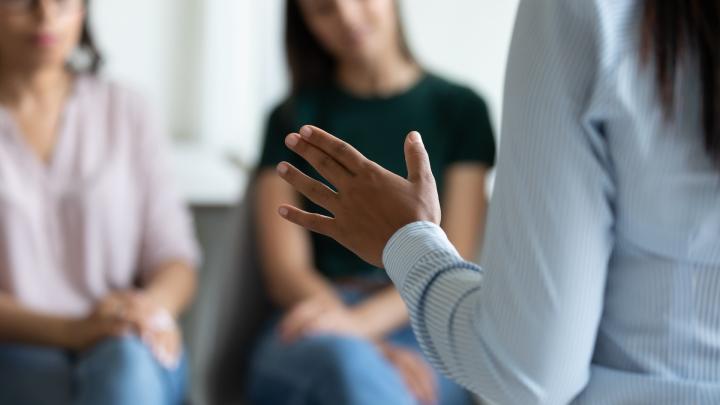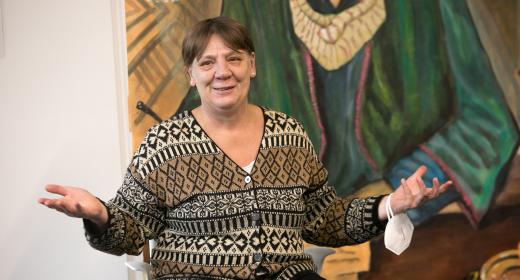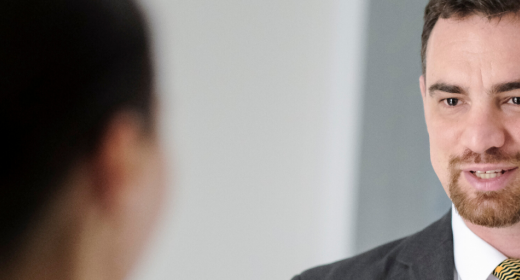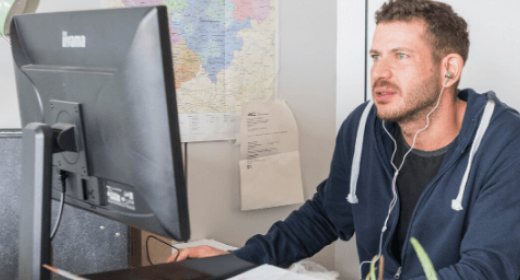Advising female returnees who have experienced distress and violence places special demands on advisors. The organisation SOLWODI (Solidarity with Women in Distress), partnered with the GIZ, has been advising and helping women who have experienced human trafficking, forced prostitution, relationship violence and the like ever since 1985. Charlotte Becker, Anna Evdokunin and Aferdita Salihu from the coordination unit at the SOLWODI Return and Integration Project in Mainz give their tips on the most important issues during counselling.
“Taking the time to reassure women”

“Taking the time to reassure women”
How do you create an atmosphere of trust in the first consultation?
The experience of the SOLWODI advisors indicates that a solid basis for trust can only be established through personal contact – they don’t believe that a phone call or online conversation can be an adequate substitute. “Women who have experienced bad things are often especially distrustful on the phone. You can develop a much better rapport with the other person when you’re sitting opposite each other”, says Anna Evdokunin. It’s also better if children aren’t present at the initial consultation, as this may stop their mothers from discussing certain experiences. Aferdita Salihu recommends involving a female interpreter if there are language difficulties: “Many women don't speak as openly with male interpreters there, because the suffering they experienced was caused by men.”
What's also important is for advisors to make it clear from the beginning that the outcome of the discussions is not already fixed and that their clients don’t need to make a decision straight away. “Many people are worried and have reservations, because they perceive our counselling as being the first step towards leaving the country”, Charlotte Becker explains. "It’s important to determine what stage of the decision-making process the client is at and what her wishes and needs really are before we give them any specific offers of support. Advisors should take the time to reassure women that we’re genuinely there for them.”
What needs to be considered when experiences of violence or exclusion come up?
On the one hand, advisors need lots of information to enable them to assess a woman’s situation. On the other hand, there’s a risk of infringing people's boundaries by asking too many questions. “We have to make it clear that we aren’t interrogating the client but we do need certain information that’s relevant to their future – such as whether the woman could be in danger after returning”, Charlotte Becker explains. "Many women don’t want to talk about shame-related issues like sexual violence or cutting. We don’t even need to know every single detail, a pointer is often enough as background information.”
Advisors should react patiently and understandingly if women are overwhelmed by emotions when recounting their stories, but shouldn't "smother them with compassion", stresses Aferdita Salihu. That would be counterproductive, because it could commit the client to a passive victim role and thereby weaken them. “Our main job is to empower these women. We need to make them realise that they’ve already achieved a lot – despite all they’ve been through – and that they can achieve even more.” This attitude corresponds to the basic concept behind return counselling. The idea isn't to diminish people's self-determination but to involve and encourage them, for instance to actively seek out career development opportunities, a flat or training in their country of origin. SOLWODI supports them in this, and works with partner organisations to ensure that the services they receive are reputable and reliable.
It often helps when discussing emotional matters to point out that the woman isn’t alone in her experiences and that many others have experienced and overcome similar issues, Anna Evdokunin adds. “Setting out the specific support options helps with looking forward.” Conversations should not in principle focus on negative experiences from the past, but rather on plans for the future.
How can you give these women well-founded confidence after they return?
Developing realistic plans requires carefully enquiring about the person's existing knowledge and skills. “The women are often not even aware of their own abilities, because they’ve never been given any recognition for them”, Charlotte Becker states. Many clients also believed they weren't capable of starting afresh or learning something new. “But they often gain hope and change their outlook, for instance when they learn that they can receive a living allowance for the duration of a training course and further education.”
Becker stresses that the choice of organisation to support a client during the reintegration process has to match the way they perceive themselves. “For example, there are NGOs in many countries that specifically care for trafficked individuals. But if our clients don’t see themselves as victims of trafficking, then we have to respect that and choose another organisation.” Although it may be seen as helpful to establish personal contact with the organisation before travelling. “Women feel very reassured if they have already been able to exchange ideas with the contact person and build up trust”, says Aferdita Salihu.
Counselling should not provide too rosy a depiction of the opportunities on the job market and the situation in the person's country of origin. Salihu believes that mistrust can arise if advisors promise too much. “The women are well aware that the situation in their country is still difficult and that the patriarchal structures haven’t simply disappeared – we don't try and dismiss that.”
What professional development courses are particularly useful in being able to provide women with good advice?
Courses involving intercultural communication are always helpful. Many cultures consider it odd that women would ask questions, let alone contradict you, Anna Evdokunin explains. “They smile and nod, even if they haven’t understood a word of what you said. An advisor who’s not aware of this might think that everything is sorted. That's often far from the case!”
What should men who advise female returnees pay particular attention to?
Many women react sensitively to body language signals indicating male dominance. Advisors should therefore pay special attention to their facial expressions and gestures, says Aferdita Salihu. “They also shouldn’t cross their arms or hide them behind their back.” Active listening is important. Instead of just working through a list of questions, advisors should allow the client to talk and not immediately interrupt her if she digresses. These women often need these diversions to find an answer to the questions they’re asked. Return counselling generally takes time.
As of: 10/2021
Advisors providing return counselling can always access the SOLWODI network and expertise if they have any questions on how to advise women or regarding country-specific cultural aspects. SOLWODI also runs regular conferences relating to return and reintegration as well as holistic advice. Further information: www.solwodi.de.



